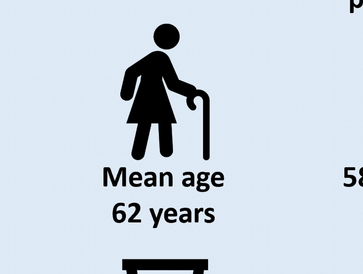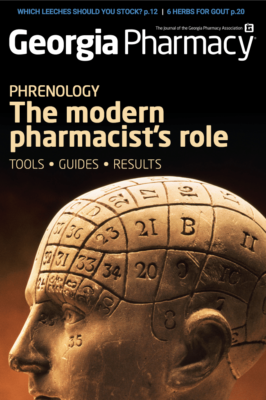Fentanyl vaccine, Covid/cancer combo drug, Amazon opening clinics, and more
16 Nov 2022
Posted by Andrew Kantor
ICYMI: Amazon will see you now
Amazon is planning to open virtual clinics in 32 states, including Georgia, for patients to get treatment for about 20 health conditions. It’s for non-urgent issues from dandruff and acne to birth control and UTIs, but doesn’t (yet) take insurance.
And if someone needs a prescription? They can have it (Amazon Pharmacy) filled at (Amazon Pharmacy) the pharmacy (Amazon Pharmacy) of their (Amazon Pharmacy) choice, of course.
Take advantage of the amoxicillin shortage
There’s a silverish lining to the amoxicillin shortage — it’s a chance to remind people (healthcare pros and civilians) that antibiotics don’t treat viruses.
“Seems like a good time to remind people that the vast majority of respiratory infections are caused by viruses and that antibiotics like amoxicillin do absolutely nothing for them except give people diarrhea.”
Fun facts from the American Academy of Pediatrics:
- One in 5 pediatric ambulatory visits result in an antibiotic prescription.
- Half (!) are inappropriate.
- Two-thirds are for respiratory tract infections; and
- a third of those are unnecessary
Covid for the holidays: 🤷♂️
Apparently not having gotten the memo about sending mixed messages — or looked at data from the CDC and other health experts — White House Covid-19 coordinator Ashish Jha said he doesn’t expect a holiday Covid surge. (Unless he means “not as big a surge as other years.”)
“
God himself couldn’t sink this ship.I believe we are in a way better place no matter what Mother Nature throws at us.”
It’s also a dessert topping
One drug can help stop Covid-19 as well as making some cancers easier to treat.
USC researchers have found a new weakness of the SARS-CoV-2 virus. A chaperone protein called GRP78 is used by normal cells, but it’s hijacked by the Covid virus to help it spread. Take away GRP78 in the lungs, and the virus has trouble replicating — no matter what the variant.
And there’s a bonus. The drug they use against GRP78 (called HA15) can help with cancer treatment. Besides suppressing GRP78*, it can also suppress a protein that helps mutated cancers resist drug treatment. And it can even make those mutated cancer cells less viable.
It seems that the deeper into the cellular level you get, the more you find that a lot of biological processes are related — and treatable.
* I really wish they’d give everything a name.
Today’s “game-changer”
A vaccine for fentanyl addiction. Yep. Pharmaceutical researchers at the University of Houston developed a vaccine that creates “anti-fentanyl antibodies.”
[They] bind to the consumed fentanyl and prevent it from entering the brain, allowing it to be eliminated out of the body via the kidneys. Thus, the individual will not feel the euphoric effects and can ‘get back on the wagon’ to sobriety.
And get this: It only works for fentanyl, so patients could still be treated with, say, morphine if necessary. So far it’s been shown to have no side effects … on rats, at least.
EHR vendors behaving badly
In order to get themselves certified for use by health practitioners, at least six electronic health records vendors misrepresented the functionality and security of their products … and got caught when complaints were filed.
They paid more than $379.8 million dollars in fines, but kept it quiet; it took health researchers to check out the CMS data to discover it. They estimate that “more than 76,831 unique clinicians used these six vendors during the period of the complaints.”
So what? For practitioners, problems could range from money down the drain on an ineffective system, to the chance of a data breach because of substandard security. Maybe your patients will be understanding, maybe they won’t….
Getting the band back together
Are you still hankering to return to the 1950s? The good news continues! Not only are measles and tuberculosis making comebacks, scarlet fever is appearing in Asia, and polio is popping up in the US … guess who’s back? Diphtheria.
It’s being detected in overcrowded detention centers in the UK — and, with the high concentration of people in similar camps in the US, we might get lucky and continue down the road that ends with bloodletting and plague doctors. Whee!
The incredible shrinking pharmacist
If you hesitate to give a patient mental health advice, you’re not alone. A recent Australian study found that “pharmacists report not intervening about 25% of the time when they believe a patient is experiencing a problem or crisis*.”
One problem, the study authors say, is that while pharmacists know how to help people with mental health issues, they aren’t always trained in recognizing when someone needs help. And with people these days more likely to need that help, it’s important to catch that important off-hand comment (“You gotta pill that can get me motivated?”).
* This is in Australia, but it’s not a stretch to think that it holds true here.
Get yours in the morning
Exercise in the morning (say Dutch researchers) is “associated with lower risks of incident cardiovascular diseases.”
We particularly love what the Dutchies think of people over 60. Here’s the graphic they used:




